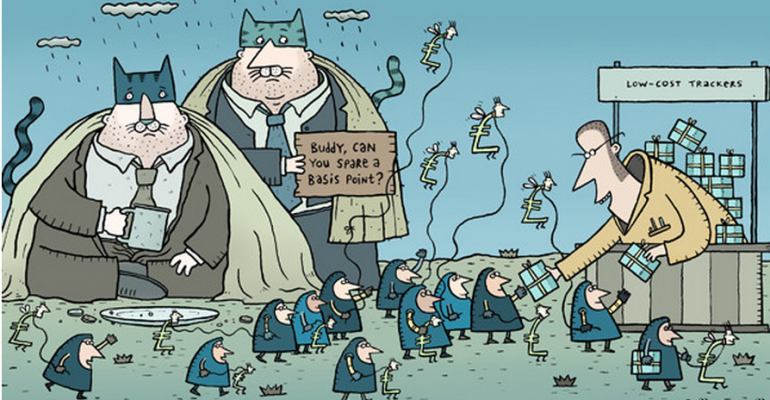A recent piece in The Economist, “Will Invest for Food,” argues that the rise of index funds and ETFs are leading to the commoditization of investment management. Tracker funds, or index funds, will double their market share by 2020, the publication reports. Advisors, on the other hand, are safe.
The author writes:
As investors wake up to the maths, active fund management is starting to face the kind of pressure seen in other industries, like newspapers, record labels and taxi companies, which are losing their role as gatekeepers. A report by the accountants at PwC forecasts that low-cost funds will double their share of the global fund-management industry by 2020 from 11% to 22%.
Earlier generations of investors were prepared to believe that the returns achieved by fund managers were down to skill. Now it has become clear that the returns were the result of factors that can be replicated. Like shoppers on a budget, investors are trading down from expensive brands to white-label goods. That may put many active managers out of a job.
The squeeze on asset managers is being driven by three trends, the publication says: the rise of ETFs, the proliferation of alternative indices (or smart beta), and the acceleration of defined contribution plans, at the expense of defined benefit plans.
Because many advisors are switching to a fee-based model, that has allowed them to recommend cheaper products, such as ETFs and index funds. Whether the product pays a large commission or not, you’re going to get paid either way.
“Governments should ensure that financial advisers are paid, not by product providers, but by clients,” The Economist wrote in a separate opinion piece. “Most countries should follow Britain’s example and stop the use of commissions.”
I’ve heard that a ban on commissions would probably never fly in the U.S. because the firms on Wall Street—that derive much of their profits from commissions—have too much lobbying power. Do you think the U.S. should ban commissions?
The Economist piece doesn’t paint a pretty picture for the future of the fund management industry. But it’s a good picture for investors.
Meanwhile, advisors are safe, the article argues. Despite fears about the rise of the robo-advisors, the advice industry has not become commoditized, with 80 percent of retail investors paying for advice. Outperforming a benchmark no longer matters as it used to, but people still need advice:
Good advice is certainly worth something: many American investors in pension plans have devoted a big proportion of their portfolios to cash (a low long-term return) or to their employer’s shares (too risky). The ability to avoid such mistakes is worth a one-off fee. But an investor should not pay 1% to 1.5% a year to an adviser. Nobody has yet shown that they can correctly and consistently time markets.
Do you think your fees will come down? Is the advice industry next in line to become commoditized?


